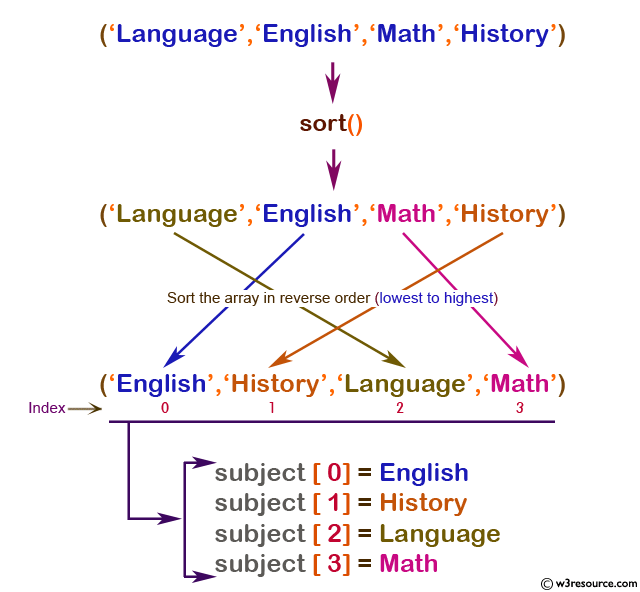PHP: sort() function
PHP: Sort an array
The sort() function is used to sort array elements. Elements will be arranged from lowest to highest when this function has completed.
Version:
(PHP 4 and above)
Syntax:
sort(array_name, sorting_type)
Parameters:
| Name | Description | Required / Optional |
Type |
|---|---|---|---|
| array_name1 | Specifies the array. | Required | Array |
| sorting_type | Sets the sorting behavior. Possible type : SORT_REGULAR - Compare items normally. SORT_NUMERIC - Compare items numerically. SORT_STRING - Compare items as strings. SORT_LOCALE_STRING - compare items as strings, based on the current locale. |
Optional | Mixed* |
*Mixed: Mixed indicates that a parameter may accept multiple (but not necessarily all) types.
Return value:
TRUE on success or FALSE on failure.
Value Type : Boolean.
Example:
<?php
$subject = array("Language", "English", "Math", "History");
sort($subject);
foreach ($subject as $key => $val)
{
echo "subject[ " . $key . "] = " . $val . "<br />";
}
?>
Output:
subject[ 0] = English subject[ 1] = History subject[ 2] = Language subject[ 3] = Math
Pictorial Presentation:

View the example in the browser
Practice here online :
See also
PHP: Tips of the Day
How to Sort Multi-dimensional Array by Value?
Try a usort, If you are still on PHP 5.2 or earlier, you'll have to define a sorting function first:
Example:
function sortByOrder($a, $b) {
return $a['order'] - $b['order'];
}
usort($myArray, 'sortByOrder');
Starting in PHP 5.3, you can use an anonymous function:
usort($myArray, function($a, $b) {
return $a['order'] - $b['order'];
});
And finally with PHP 7 you can use the spaceship operator:
usort($myArray, function($a, $b) {
return $a['order'] <=> $b['order'];
});
To extend this to multi-dimensional sorting, reference the second/third sorting elements if the first is zero - best explained below. You can also use this for sorting on sub-elements.
usort($myArray, function($a, $b) {
$retval = $a['order'] <=> $b['order'];
if ($retval == 0) {
$retval = $a['suborder'] <=> $b['suborder'];
if ($retval == 0) {
$retval = $a['details']['subsuborder'] <=> $b['details']['subsuborder'];
}
}
return $retval;
});
If you need to retain key associations, use uasort() - see comparison of array sorting functions in the manual
Ref : https://bit.ly/3i77vCC
- New Content published on w3resource:
- HTML-CSS Practical: Exercises, Practice, Solution
- Java Regular Expression: Exercises, Practice, Solution
- Scala Programming Exercises, Practice, Solution
- Python Itertools exercises
- Python Numpy exercises
- Python GeoPy Package exercises
- Python Pandas exercises
- Python nltk exercises
- Python BeautifulSoup exercises
- Form Template
- Composer - PHP Package Manager
- PHPUnit - PHP Testing
- Laravel - PHP Framework
- Angular - JavaScript Framework
- Vue - JavaScript Framework
- Jest - JavaScript Testing Framework
